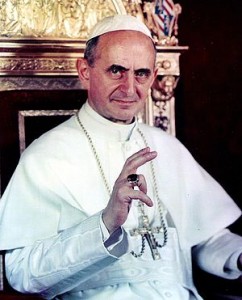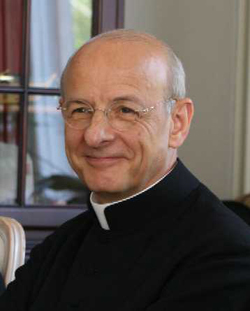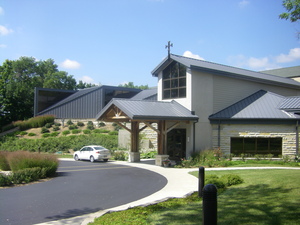 The Venerable Servant of God Pope Paul VI died on this day in 1978, the Feast of the Transfiguration. He was the Roman Pontiff for 15 years. Notable in his pontificate were several events: the closing of the Second Vatican Council, the erection of the created a Secretariat for non-Christians, later renamed the Pontifical Council for Interreligious Dialogue, the publication of 7 encyclicals including the most contentious of the 20th century, Humane Vitae, the mutual lifting of the ex communications between Rome and Constantinople (Patriarch Athenagoras) and the meeting with Pope Shenouda III (of Egypt) resolving Christological differences, the meeting with Archbishop Michael Ramsey of Canterbury, plus he held 6 consistories that created 143 cardinals. The reform of the sacred Liturgy is likely the one enduring bone of contention that gets lots of people riled up to this day.
The Venerable Servant of God Pope Paul VI died on this day in 1978, the Feast of the Transfiguration. He was the Roman Pontiff for 15 years. Notable in his pontificate were several events: the closing of the Second Vatican Council, the erection of the created a Secretariat for non-Christians, later renamed the Pontifical Council for Interreligious Dialogue, the publication of 7 encyclicals including the most contentious of the 20th century, Humane Vitae, the mutual lifting of the ex communications between Rome and Constantinople (Patriarch Athenagoras) and the meeting with Pope Shenouda III (of Egypt) resolving Christological differences, the meeting with Archbishop Michael Ramsey of Canterbury, plus he held 6 consistories that created 143 cardinals. The reform of the sacred Liturgy is likely the one enduring bone of contention that gets lots of people riled up to this day.
It must be said in my opinion, not all the problems that Paul faced were of his making. Society was haywire which adversely affected the Church in all quadrants.
Back in June the Vatican newspaper published a translation of a homily likely never read in English by many Americans given to honor the deceased Pontiff by the cardinal-archbishop of Munich, Joseph Ratzinger.
In a homily given by Joseph Ratzinger recalling Pope Paul VI, he said, “the transfiguration promised by the faith as the transformation of man is above all a journey of purification, a journey of suffering. Paul VI accepted his papal service increasingly as a transformation of faith in suffering. The last words of the Risen Lord to Peter, after constituting him as the Shepherd of his flock, were: “when you are old, you will stretch out your hands, and another will gird you and carry you where you do not wish to go” (Jn 21:18). It was a reference to the cross awaiting Peter at the end of his journey. It was, in general, a reference to the nature of this service. Paul VI let himself be lead more and more where as a human being he did not want to go alone. More and more the pontificate meant for him wearing the cloth of another, being nailed to the cross. (…) He gave new value to authority as service, bearing it as suffering. He took no pleasure in power, in position, in a successful career; and it was precisely because of this, his dutiful authority – ‘they will lead you where you do not want to go’ – became great and credible. Paul VI carried out his service by faith. From this derived both his firmness and his willingness to compromise. For both he was criticized, and some comments after his death were even in bad taste. But today a Pope who isn’t criticized would be failing to carry out his duty to this age. Paul VI resisted the intense scrutiny of the media, the powers of the day. He could do this because he didn’t consider success and approval the measure of truth and faith, but rather his conscience.
Those who met him in his last years were able to experience directly his extraordinary transformation in faith, its transfiguring power. One could see how much the man, who by his nature was an intellectual, surrendered himself day after day to Christ, how he let himself be changed, transformed, purified by him, and how this made him ever more free, ever more profound, good, perceptive and simple.
Faith is a death, but it is also a metamorphosis for entering into authentic life, towards transfiguration. In Pope Paul one could see all this. Faith gave him courage. Faith gave him goodness. And in him it was also clear that a faith of conviction is not closed but open. In the end, our memory will treasure the image of a man who held out his hands. He was the first Pope to have travelled to all the continents, fixing in this way an itinerary of the Spirit, which began in Jerusalem, the centre of meeting and of parting of the three great monotheistic religions; then his journey to the United Nations, to Geneva, his meeting with humanity’s greatest non-monotheistic religious cultures, India, and his pilgrimage to the people who suffer in Latin America, in Africa, in Asia. Faith holds out its hands. Its sign is not a fist, but an open hand”.
Joseph Cardinal Ratzinger
1978 homily for Pope Paul VI
L’Osservatore Romano
21 June 2013





 Disciples Called to Witness: The New Evangelization is the title chosen for the document that “focuses on reaching out to Catholics, practicing or not, who have lost a sense of the faith in an effort to re-energize them”, as described in a note by the United States Conference of Catholic Bishops (USCCB).
Disciples Called to Witness: The New Evangelization is the title chosen for the document that “focuses on reaching out to Catholics, practicing or not, who have lost a sense of the faith in an effort to re-energize them”, as described in a note by the United States Conference of Catholic Bishops (USCCB). 

